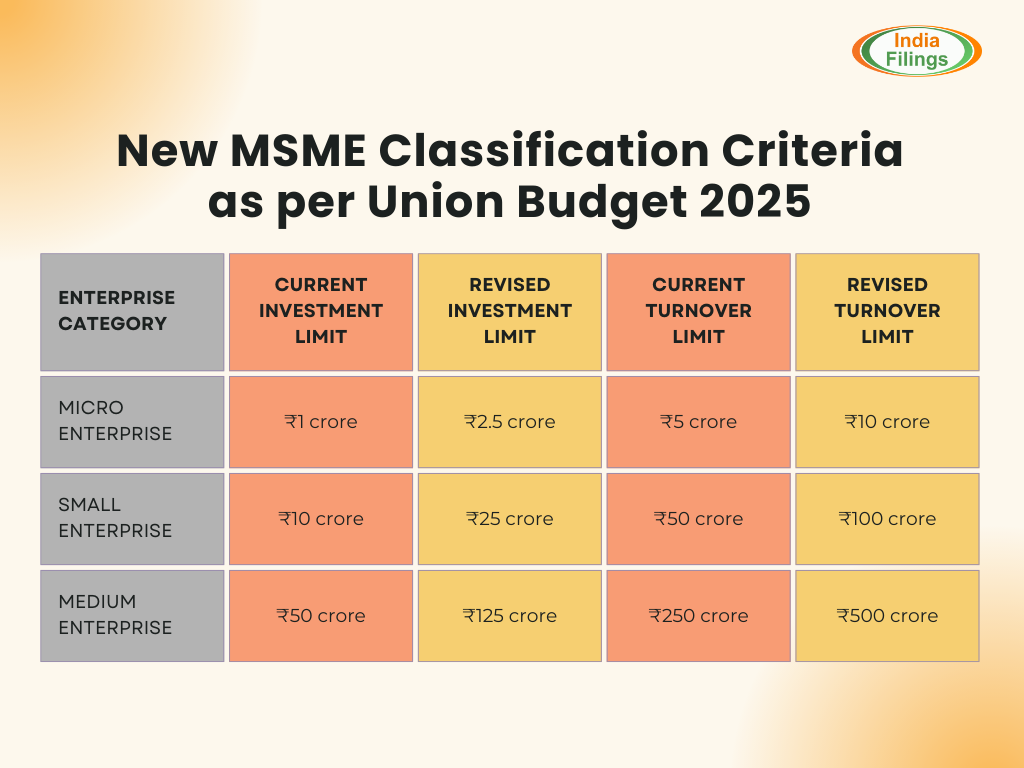Syllabus: GS3/ Economy
In News
- The government has notified significant revisions to the turnover and investment criteria for classifying Micro, Small, and Medium Enterprises (MSMEs), which will come into effect from April 1.

Significance of MSMEs
- Dynamic & Vibrant: Evolving over five decades, MSMEs play a vital role in India’s economic and social development.
- Employment: Employs 24.14 crore people, making it second only to agriculture in job creation.
- Nearly 40% of the 6.13 crore registered MSMEs are women-owned.
- Ancillary Role: Complements large industries, serving as ancillary units and boosting inclusive industrial development.
- Rural Reach: Helps industrialise rural and backward areas, reducing regional disparities.
- Global Footprint: Produces a diverse range of products and services for both domestic and international markets.
- Self-Reliance Mission: With over 6 crore units, MSMEs are key to building a strong, self-reliant India.
Challenges of MSMEs
- Limited Access to Finance: Many MSMEs lack formal credit history, collateral, or proper documentation to secure loans from banks.
- Example: According to SIDBI, only 16% of MSMEs get formal credit; the rest rely on informal sources or NBFCs at higher interest rates.
- Low Technology Adoption: Most units still operate with outdated machinery, affecting productivity, quality, and scalability.
- Example: Textile MSMEs in Surat still rely on traditional looms, limiting their ability to compete with Chinese manufacturers.
- Limited Market Access & Exports: MSMEs contribute 48% to India’s exports, but only a small percentage are directly exporting.
- Example: Handicraft MSMEs in Rajasthan often lack online platforms or export licenses to scale internationally.
- Skill Shortage & Labour Issues: Over 70% of MSMEs face difficulty in hiring skilled manpower, as per a FICCI survey.
- Delayed Payments from Buyers: Larger companies delay payments, choking the cash flow of MSMEs.
- Example: MSMEs supplying to government PSUs often face delays of 3–6 months, disrupting working capital cycles.
Initiatives to Boost MSMEs
- Udyam Registration Portal: A simplified online portal for MSME registration, providing them with a unique identification number and facilitating access to various government schemes.
- Public Procurement Policy for MSEs: Mandates that a certain percentage of procurement by government ministries and PSUs must be sourced from MSEs.
- Entrepreneurship and Skill Development Programme (ESDP): Conducts various training programs to promote entrepreneurship and develop skills relevant to MSMEs.
- Credit Guarantee Fund Trust for Micro and Small Enterprises (CGTMSE): Provides collateral-free loans up to ₹5 crore to MSMEs. The guarantee coverage varies based on the loan amount and category of the borrower.
- Pradhan Mantri Mudra Yojana (PMMY): Offers loans up to ₹10 lakh to non-corporate, non-farm small and micro-enterprises. These loans are categorized as ‘Shishu’ (up to ₹50,000), ‘Kishore’ (above ₹50,000 and up to ₹5 lakh), ‘Tarun’ (above ₹5 lakh and up to ₹10 lakh) and ‘Tarun Plus’ ( between 10 lakh to 20 lakh).
- Scheme of Fund for Regeneration of Traditional Industries (SFURTI): Organizes traditional artisans into clusters to make them more competitive and provide sustainable employment.
- PM Vishwakarma: Provides comprehensive support to artisans and craftspeople, focusing on skill development, toolkits, credit access, and market linkage.
Source: TH
Previous article
Inclusive Development
Next article
DNA’s Role in Identification